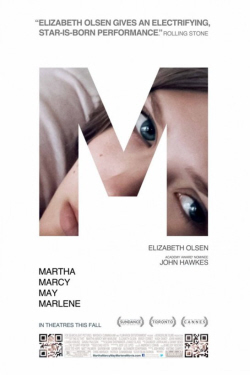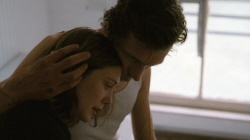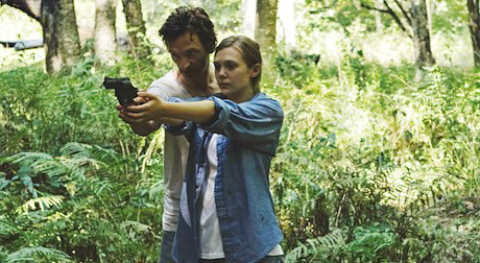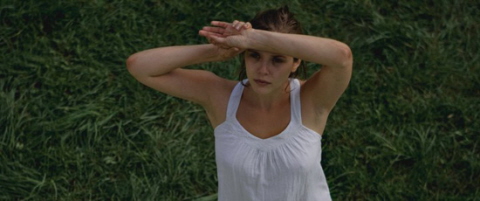Hi, I’m Tim. Like you friend, I too love movies. I was at GUY but now I’m here. We caught up to speed? Cool, let’s do this.
 On a year when I scored Human Centipede 2 a “Bloody Poop out of 10,” I’m more than a little surprised that that film isn’t the most unsettling one I’ve seen in 2011. Instead, I bestow that honor to Martha Marcy May Marlene. Disturbing both emotionally and physically, I was surprised by how affected I was by what I saw.
On a year when I scored Human Centipede 2 a “Bloody Poop out of 10,” I’m more than a little surprised that that film isn’t the most unsettling one I’ve seen in 2011. Instead, I bestow that honor to Martha Marcy May Marlene. Disturbing both emotionally and physically, I was surprised by how affected I was by what I saw.
That’s because there’s more on the line in a film like Martha Marcy May Marlene. You’re probably never going to be sewn face-to-ass like in HC2 (unless you’re actively seeking that out, at which point, ew). But this film is an altogether different beast, as what Martha has lost is something we hold deepest within our beings but think very little about day-to-day: our identities.
Martha Marcy May Marlene is a twofold story about the ramifications of losing one’s identity. Running concurrently and weaving in and around each other, the film manages to be linear and nonlinear all at once: showing us the trauma that came of Martha’s identity being torn away intercut with the pain and listlessness she encounters as she struggles to put the pieces back after the fact.
In an odd sense, writer / director Sean Durkin’s film begins at the middle point: Martha (Elizabeth Olsen) fleeing the abusive commune (read, cult) she has been a part of for the last several years. She then reestablishes contact with her sister Lucy (Sarah Paulson) who takes Martha back to her vacation home she rents with her husband (Hugh Dancy). The film then shows us both sides of this coinflip: Martha’s attempted reintegration with her family spliced with her time in the cult as well as the hardships she endures on both ends.

That synopsis might not sound like edge-of-your-seat material, but Durkin (in his first feature-length film) is able to suck the air out of both his characters and the audience leading into the film’s final act. As she tries to settle back into a normal life with her sister, Martha begins experiencing the echoes of what she did with the cult. When she first joined, those around her seemed like decent-enough people working to establish a self-sustaining farm. But as soon as the leader Patrick (John Hawkes) begins his indoctrination of Martha, her life becomes a veritable nightmare landscape of rape, emotional torture and, eventually, cold-blooded murder.
It’s not all sunshine and lollipops when Martha settles in with Lucy and her husband Ted, either. Olsen and Paulson do an incredible job relaying the distance that needs to exist between the two sisters, and Dancy’s character is seemingly at odds with what he’s gotten himself into with the two. Like Martha, Lucy is far from perfect. Distant and at times petty and shallow, she’s the wrong (but only) person for Martha to reach out to. Over time, it becomes clear that Martha has gone through some pretty intense shit. But too often, as all the warning signs becomes evident, Lucy berates her sister by asking “What the fuck is wrong with you?” Very few in the film are capable of navigating emotional waters.
 Except, of course, Patrick – the manipulative cult leader played to the bone-thin hilt of creepiness by John Hawkes. This isn’t “Do” from Heaven’s Gate, castrating his disciples and shoving them into Keds awaiting a spaceship that’ll never come. Patrick’s manipulations are manifested through paternal guidance, sex and then intimidation. He and his fellow male counterparts amass a bevy of harem, breaking them down and building them back up into their sex slaves. It’s haunting to first see Martha get raped and then later on, act complacently as she assists in the ritual rape of a new recruit.
Except, of course, Patrick – the manipulative cult leader played to the bone-thin hilt of creepiness by John Hawkes. This isn’t “Do” from Heaven’s Gate, castrating his disciples and shoving them into Keds awaiting a spaceship that’ll never come. Patrick’s manipulations are manifested through paternal guidance, sex and then intimidation. He and his fellow male counterparts amass a bevy of harem, breaking them down and building them back up into their sex slaves. It’s haunting to first see Martha get raped and then later on, act complacently as she assists in the ritual rape of a new recruit.
As Martha’s trauma in the cult heightens so too does her torment in the present as she is unable to escape her conflicted feelings. Every crackle she hears outside, every person she sees off in the distance, and every telephone rings, all reminders in their own right. They might, they might not, but they can come for her at any time.
In that respect, Durkin’s film is essentially a two-hour exercise in inducing panic attacks. Early on, it unfolds primarily on tracking shots – as if everything feels safe and smooth from the comfort of a dolly. But overtime he starts integrating handheld shots and angles that displace us and uproot our senses. It’s a tactic that reads slightly film-schoolish, but in the context of the film it works. For what feels like the entire second half, you’ll be assaulted by a faint hum that grows louder and louder as Martha denigrates into a mess of panic and anger. It’s not always noticeable, but it adds to the aesthetic of discomfort that Martha Marcy May Marlene enshrouds itself in.

I suspect some people will look down on Martha and the film by extension, due to the fact that she stays at this awful cult for so long. But watching closely, Elizabeth Olsen’s character is clearly emotionally damaged before she ever set foot on Patrick’s farm. These are the kind of people that join cults after all – withdrawn, looking for answers and not finding comfort in modern society. An identity needs to be fractured before it can be removed piece-by-piece, and she is no doubt a fractured individual. Outside of she and Lucy being orphans at an early age, it’s never revealed what issues had befallen Martha prior to indoctrination.
I don’t think Elizabeth Olsen (yes, the beautiful sibling of those frightful twins) was on anybody’s radar prior to this film. She certainly wasn’t on mine. But she’s fearless in this role, and deserves a lot of love come awards time. Her performance is so nuanced, working through so many levels and walls without denigrating into overly-saccharine weepiness. Oscars rarely end up in the most-deserving hands, so I’m not going to speculate on what will ultimately become of her nomination (and she will most definitely be nominated), but I’ll settle for the emergence of very talented, young actor.
If I were to find any fault with the film it would have to lie with that ending, or lack of one. You’ll leave the theater with a lot to marinate and stew about, but I would have liked to have seen more closure, as we’re robbed of any sort of real resolution for Martha or the characters that have surrounded her. Granted, that’s Durkin’s point in his identity-crisis film – to leave his viewers feeling as uprooted as Martha feels. But I think a film that grapples with so much uncertainty for the duration would have benefitted from something more definitive. This is as close to a Sopranos-style “Made in America” ending I’ve seen in a two-hour film. Sometimes that can work; in this case it feels like a missed opportunity.

Martha Marcy May Marlene is a film that challenges you to embrace it. Its slow burn and dual-narratives will be confounding to those unwilling to look deeper and immerse themselves in the aesthetics it’s trying to get across. It asks a lot from the viewer at a time when Tower Heist is par for the course in our theaters. Anchored by one of the best performance of 2011, Martha Marcy May Marlene plays with our notions of identity and is unafraid to ask us to be thoughtful participants.
Rating:




Out of a Possible 5 Stars